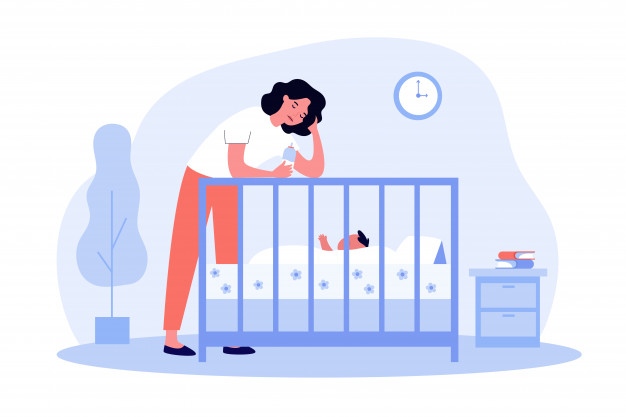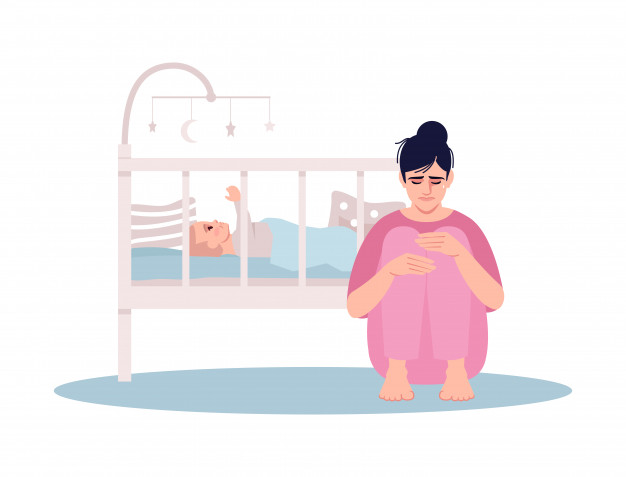Are you a new mother and overwhelmed with a mixture of feelings? Do you suddenly cry without a specific reason? Are you astonished how you went from being happy and excited to meet your baby to feeling sad, anxious, irritable, and emotionless. Do not worry; you may be experiencing a psychological state known as “Baby Blues”, which usually hits new mothers soon after delivery. Studies show that almost 60-80% of mothers, whether it is their first baby or not, have these feelings.
It is thought that baby blues is related to hormonal changes, mainly estrogen and progesterone, during pregnancy and their sudden drop after delivery. These hormonal changes may lead to chemical changes in the brain resulting in mood swings or depression in some cases. Moreover, the pain you encounter during delivery, whether normal delivery or C-section, in addition to the stress trying to cope with your newborn baby may trigger the symptoms.

Baby Blues symptoms are very normal and are likely to fade away on their own without treatment within a couple of weeks. In order to overcome these feelings, you have to ask for help from your husband, family, and friends, so that you can feel better to look after your baby. However, if these symptoms do not fade away or get worse by time, you may be suffering from a serious mood disorder known a postpartum depression. Up to 15% of mothers suffering from baby blues may develop this long-lasting depression. It can start within the first month after childbirth, but it can also start anytime during the first year.
The symptoms of postpartum depression vary from mild to severe; some of the symptoms can be mistaken with the baby blues symptoms at the beginning. Mothers suffering from this depression have difficulty bonding with their babies and continually question themselves whether they are good mothers or not. They usually prefer to stay alone and withdraw from family and friends. Symptoms also include inability to sleep or sleeping longer than usual, losing interest in normal activities enjoyed before delivery, intense anger, severe panic attacks and anxiety, loss of energy and the ability to think clearly and take decisions. Some mothers have very serious symptoms that may include thoughts of hurting the baby, suicidal thoughts, or feeling paranoid and suspicious.

Women who once suffered of any kind of depression, including postpartum depression, or who have a family history of depression are more likely to develop postpartum depression. Moreover, women who had a stressful pregnancy or who have some marital issues are also prone to depression. This depression can affect the father as he may feel depressed too, and the children also are more likely to have sleeping and eating disorders, cry more than usual, and suffer delays in language development.
The current situation of the global pandemic and self-quarantine can worsen the symptoms of depression due to the mothers’ concerns that their babies might be infected by the coronavirus The situation is made worse being locked-up for a long time in the house with their babies without having some free time for themselves to do any activities on their own to vent. Moreover, social distancing and the fear of meeting people can let patients think twice before seeking medical help.
Usually, people suffering from depression do not recognize that on their own, so if you feel that someone you know have the mentioned symptoms, you can advise them to seek medical help. There are some actions that may help; such as: leaving your baby with a family member for a while, to be able to get enough sleep, eating balanced meals, exercising, and taking time to relax, in addition to sharing your thoughts with trusted people. If all of the above does not help, it is highly recommended to see a psychologist or psychiatrist to find the best treatment according to the severity of the case. Treatment may include anti-anxiety and anti-depressant medication, psychotherapy, and participation in a support group for emotional support and education.
Aa a mother of two boys, I have been through some of these symptoms. It was not easy to overcome the depression after the first baby, and I am still fighting most of the abovementioned symptoms as my youngest baby is a couple of months away from turning one. Every woman and new mother should admit that she is suffering from a certain degree of postpartum depression and that she needs help; it is nothing to be ashamed of.
References
mayoclinic.org
webmd.com
healthline.com
Images designed by Freepik